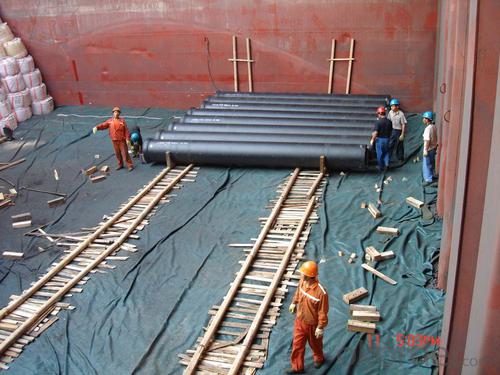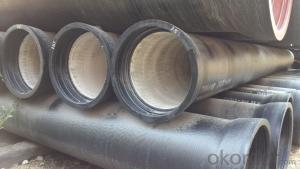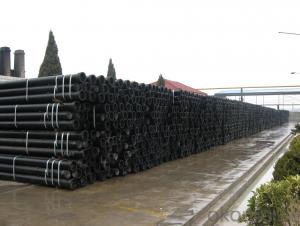Ductile Iron Pipe DN850
OKorder Service Pledge
Quality Product, Order Online Tracking, Timely Delivery
OKorder Financial Service
Credit Rating, Credit Services, Credit Purchasing
You Might Also Like
Specifications
Quick Details
| Place of Origin: | China (Mainland) | Brand Name: | CMAX | Model Number: | T type / K type / Flange type |
| Length: | 6m / 5.7m / Negotiable | Standard: | ISO2531 / EN545 / EN598 | Application: | Potable / Sewage water |
| Diameter: | DN80~DN2200 | Shape: | Round | Hardness: | 230 |
| Pipe Wall Thickness: | standard | Pull Strength: | 420 | Yield (≥ MPa): | 300 |
| Material: | Ductile Iron | Type: | Centrifugal ductile cast iron pipe | Certification: | ISO2531 / EN545 / EN598 |
| Outer Diameter: | 80-2200 | Thickness: | standard | Specification: | DN80~DN2200 |
| |
The advantages to the customer:
Trustworthy financial strength.
One-stop shopping.
Fast and efficient service.
Coordination of shipments from multiple plants.
Specialists of the overseas shipping process.
A more competitive price.
- Q: What is the expected thermal expansion coefficient of ductile iron pipes?
- The expected thermal expansion coefficient of ductile iron pipes typically ranges from 10.8 to 12.2 x 10^-6 per degree Celsius.
- Q: Can ductile iron pipes be used in agricultural applications?
- Yes, ductile iron pipes can be used in agricultural applications. Ductile iron pipes are known for their strength, durability, and corrosion resistance, making them suitable for various agricultural uses such as irrigation systems, water supply networks, and drainage systems. They can withstand high pressure, handle heavy loads, and are also resistant to external factors like soil movements and root penetration.
- Q: Can ductile iron pipes be used for oil and gas pipelines?
- Ductile iron pipes can indeed be utilized for oil and gas pipelines. This robust and long-lasting material possesses corrosion resistance, rendering it ideal for the transportation of oil and gas across extensive distances. Moreover, ductile iron pipes display exceptional pressure-bearing capabilities, enabling them to endure the high pressures commonly associated with oil and gas transportation. Additionally, the installation and maintenance of ductile iron pipes are relatively straightforward, further enhancing their suitability for oil and gas pipelines. Nevertheless, it is crucial to acknowledge that the specific application and conditions of the pipeline necessitate careful consideration. Therefore, seeking advice from industry experts is strongly recommended to ensure the appropriate selection and installation of ductile iron pipes for oil and gas transportation.
- Q: Can ductile iron pipe be used for industrial process piping?
- Yes, ductile iron pipe can be used for industrial process piping. Ductile iron pipe is known for its strength, durability, and resistance to corrosion, making it a suitable choice for various industrial applications. It can handle high-pressure systems and is often used in industries such as water and wastewater treatment, oil and gas, chemical processing, and power generation. Additionally, ductile iron pipe is easy to install and has a long lifespan, making it a cost-effective option for industrial process piping.
- Q: Are ductile iron pipes suitable for railway crossings?
- Railway crossings can indeed utilize ductile iron pipes. Ductile iron, a robust and long-lasting material, finds extensive use in numerous applications, which include water and sewage systems. Its exceptional tensile strength and flexibility allow it to withstand heavy loads and vibrations, both of which are commonly encountered in the vicinity of railway crossings. Moreover, ductile iron pipes exhibit exceptional resistance to corrosion, making them particularly valuable in areas prone to moisture and exposure to diverse weather conditions. This resistance guarantees the pipes' durability, ultimately reducing the need for maintenance and replacement, thus cutting costs. Furthermore, ductile iron pipes are renowned for their effortless installation and versatility. They seamlessly integrate with other pipe types and fittings, facilitating their incorporation into the overall railway crossing infrastructure. However, it is important to bear in mind that the suitability of ductile iron pipes for railway crossings hinges on various factors, such as load requirements, soil conditions, and specific project specifications. Consulting engineering professionals and adhering to industry standards and regulations is vital to ensure the appropriate selection and installation of ductile iron pipes for railway crossings.
- Q: Are ductile iron pipes suitable for bridge piers or abutments?
- Yes, ductile iron pipes are suitable for bridge piers or abutments. Ductile iron is known for its high strength and durability, making it a reliable choice for supporting heavy loads in bridge construction. Additionally, ductile iron pipes are corrosion-resistant, which is crucial for structures exposed to moisture and environmental factors.
- Q: Are ductile iron pipes more expensive than other pipe materials?
- Ductile iron pipes can be more expensive than some other pipe materials, but it depends on various factors. Ductile iron pipes are known for their durability, strength, and corrosion resistance, which can make them a cost-effective choice in the long run. However, the initial cost of ductile iron pipes can be higher compared to materials like PVC or HDPE. Additionally, the installation process for ductile iron pipes may require more labor and specialized equipment, adding to the overall cost. However, it is important to consider the specific project requirements, including factors like the environment, expected lifespan, and required pressure ratings, when evaluating the overall cost-effectiveness of ductile iron pipes compared to other pipe materials.
- Q: Are ductile iron pipes resistant to corrosion?
- Yes, ductile iron pipes are resistant to corrosion. Ductile iron is a type of cast iron that has been treated with additional materials to make it more flexible and durable. These materials, such as graphite, magnesium, and cerium, create a protective barrier on the surface of the pipe, making it highly resistant to corrosion. Additionally, ductile iron pipes are often coated with a layer of cement mortar or a fusion-bonded epoxy coating, further enhancing their resistance to corrosion. This makes ductile iron pipes suitable for use in various applications, including water distribution, wastewater treatment, and industrial pipelines, where corrosion is a common concern.
- Q: How are ductile iron pipes made?
- Ductile iron pipes are made through a process called centrifugal casting. In this method, molten iron is poured into a rapidly spinning mold, which forces the iron to evenly distribute along the walls of the mold. As the mold continues to spin, the iron cools and solidifies, forming a hollow cylindrical shape. This process allows the iron to retain its strength and flexibility, making it suitable for use in various piping applications.
- Q: How do ductile iron pipes handle concentrated loads?
- Ductile iron pipes are designed specifically to effectively handle concentrated loads. Their unique composition and manufacturing process give them excellent strength and durability, making them highly resistant to cracking or breaking under heavy loads. One of the main features of ductile iron pipes is their high tensile strength, allowing them to withstand concentrated loads without deforming. During the production process, small amounts of magnesium are added to cast iron, transforming the brittle graphite flakes into nodular graphite. This modification greatly enhances the material's strength and ductility, enabling it to handle concentrated loads more effectively. Furthermore, ductile iron pipes have a high modulus of elasticity, meaning they can deform elastically under a load and then return to their original shape once the load is removed. This property allows the pipes to evenly distribute the concentrated load along their entire length, reducing stress concentrations and minimizing the risk of fractures or failures. Additionally, ductile iron pipes have a thick and robust wall thickness, ensuring exceptional structural integrity. This thickness enables the pipes to bear significant loads and withstand pressure variations without compromising their overall performance. In conclusion, ductile iron pipes are engineered specifically to handle concentrated loads due to their high tensile strength, elastic deformation capabilities, and thick wall thickness. These characteristics make them a reliable choice for a variety of applications, including water and wastewater systems, as they can withstand external forces without compromising their structural integrity.
Send your message to us
Ductile Iron Pipe DN850
OKorder Service Pledge
Quality Product, Order Online Tracking, Timely Delivery
OKorder Financial Service
Credit Rating, Credit Services, Credit Purchasing
Similar products
Hot products
Hot Searches
Related keywords
























